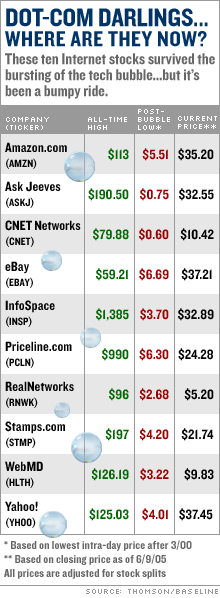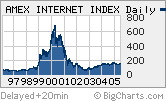 |
 |
| Internet stocks have done well recently but are still well below their all-time highs. |
|
|
|
|
|
|
|
NEW YORK (CNN/Money) -
The past 10 years have felt more like 100 for many Internet businesses.
The dot-com mania of the mid-to-late 1990s helped make some business people and investors fabulously rich, at least on paper -- and people like former Merrill Lynch analyst Henry Blodget, America Online co-founder Steve Case and the Pets.com sock puppet household names.
But the tech-stocks crash of March 2000 left many investors with stocks trading at a fraction of their all-time highs, and in some cases, worthless.
A host of unprofitable, but widely hyped, online businesses met untimely demises. Remember Webvan, Egghead.com, eToys and Furniture.com? They all went bankrupt -- and dot-com heroes quickly became zeroes.
In 2003, Blodget was barred for life from working in the brokerage business as a result of a settlement of claims that he touted Internet stocks in order to win investment banking deals for Merrill. He is now a writer for online magazine Slate.
Case left AOL in 2003 following a maelstrom of investor criticism about the company's ill-fated 2001 merger with Time Warner (Research), which also owns CNN/Money. He recently founded a new healthcare company called Revolution.
And that Pets.com sock puppet? He survives. But as a spokesdog for an auto lending company. Pets.com went out of business in late 2000.
A new bubble?
Now, 10 years after two key events in the history of the Internet -- the successful IPO of Netscape, which many cite as the beginning of Wall Street's love affair with 'Net stocks, and the founding of Yahoo! -- we're in the midst of a new, let's say mini dot-com boom. (Netscape is now owned by Time Warner.)
Since Google (Research) went public in August 2004 its shares have more than tripled, reminding many of the investor fervor of the late 1990s.
And shares of the Internet's version of the Big Three -- Amazon.com (Research), eBay (Research) and Yahoo! (Research) -- have all bounced back sharply from their post-bubble lows in the past few years.
Still, even though investors are going ga-ga for Google (the stock has recently come close to $300) and other Internet stocks, there are some key differences between the recent dot-com stock rally and what happened a few years ago.
"I'd hesitate to characterize this is as comparable to what was going on in the late 1990s," said Scott Kessler, an equity analyst with Standard & Poor's. "Not every Internet stock is doing well."
Kessler noted that most of today's Internet success stories are survivors, older companies that are now profitable and have strong balance sheets, and not start-ups that weren't earning a dime.
eBay has about $2 billion in cash, Google has $2.5 billion and Yahoo! more than $3 billion in cash on its balance sheet.
"From the wreckage of the bust we now have some fundamentally good companies," said Tom Taulli, co-founder of Current Offerings, an independent research firm focusing on IPOs.
And for the most part, established Internet firms are not spending lavish amounts of money on marketing. This year, for example, only three dot-coms advertised during the Super Bowl.
That's a stark contrast to the late 1990s. Back then, the Internet was still a relatively new concept and as such, most companies felt that the only way to break through the clutter was to spend heavily to attract users and generate ad revenue. To that end, 17 Internet companies ponied up for ads during 2000's Super Bowl.
And investors bought into it, lifting shares of nearly all Internet companies, regardless of whether there was substance other than savvy marketing.
"Back in 1998 and 1999, you got a domain name that sounded cool, raised a lot of money, rolled the dice and hopefully something good would come out of it," said Taulli.
Companies like theglobe.com, drkoop.com and Mortgage.com are examples of Internet stocks that did well for a short time, benefiting more from the rising tide than strong fundamentals. Drkoop.com and Mortgage.com are no longer publicly traded.
Theglobe.com, which went public in 1998 and jumped a record 600 percent-plus in its first day of trading (a record since broken), is still around.
But the company is living proof that investors haven't embraced all of the dot-com darlings of yesteryear. Theglobe.com (Research), which closed at $31.75 on its first day of trading, is now trading at 11 cents a share.
For a closer look at Internet stocks, click here.
For tech commentary, click here.
Analysts quoted in this story do not own shares of the companies mentioned and their firms have no investment banking relationships with the companies.
The writer of this story owns shares of Time Warner as part of his company's 401(k) plan.

|